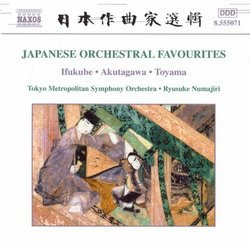| All Artists: Yuzo Toyama, Hidemaro Konoye, Akira Ifukube, Yasushi Akutagawa, Kiyoshige Koyama, Takashi Yoshimatsu, Ryusuke Numajiri, Tokyo Metropolitan Symphony Orchestra Title: Japanese Orchestral Favourites Members Wishing: 0 Total Copies: 0 Label: Naxos Original Release Date: 1/1/2002 Re-Release Date: 5/21/2002 Genre: Classical Style: Symphonies Number of Discs: 1 SwapaCD Credits: 1 UPC: 747313507122 |
Search - Yuzo Toyama, Hidemaro Konoye, Akira Ifukube :: Japanese Orchestral Favourites
 | Yuzo Toyama, Hidemaro Konoye, Akira Ifukube Japanese Orchestral Favourites Genre: Classical
|
Larger Image |
CD Details |
CD ReviewsWidely Varied Music from Japan Dr. Christopher Coleman | HONG KONG | 11/12/2002 (5 out of 5 stars) "Naxos brings us six widely varied pieces by Japanese composers on this disc of Japanese Orchestral Favourites. Yuzo Toyama's Rhapsody for Orchestra is a short suite based on four Japanese folk songs, written as an encore for one of the NHK Symphony Orchestra's European Tours. As such, it is perfect--slick, commercial, and appealing. Other works on the CD are more challenging, and for me, more rewarding. Whether they truly represent Japanese orchestral favorites I can't be sure--it's difficult to imagine such a category without a work by Toru Takemitsu--but they are certainly worth hearing. Often drenched in pentatonicism, the pieces range from the ancient--an arrangement of Gagaku Music originating in the 5th century--to the modern. The latter is well represented by Takashi Yoshimatsu's introspective Threnody to Toki for String Orchestra and Piano. The liner notes are misleading in that they describe the piano as playing "in the style of jazz"--there is no such sense in this piece. But the notes do tell us that the toki of the title is a Japanese crested ibis on the point of extinction, and that the composer sees this bird as a symbol of beauty under threat from the ever encroaching modern world. Yoshimatsu incorporates many of the extended string techniques of the avant-guard, and that he alludes to Penderecki's most notorious composition Threnody to the Victims of Hiroshima in his title can be no accident. But Yoshimatsu's use of these techniques is gentler, more evocative of a quiet sadness than a heartrending cry. More traditional than Yoshimatsu's work is Yasushi Akutagawa's Music for Symphony Orchestra. It is a two movement piece very reminiscent of Prokofiev. The variety on this disc is fantastic, from this work wholly and convincingly rooted in the traditions of Western Classical music, to Kiyoshige Koyama's piece equally rooted in the traditions of Japan. Koyama's Kobiki-Uta presents a series of variations on a wood-cutter's song. Balancing avant-guard compositional techniques with conventional ones, the work is quite intriguing.Most fascinating of all to me is the arrangement of Gagaku, an ancient form of Japanese Court Music imported from China. Composer Hidemaro Konoye does an excellent job of imitating traditional Japanese instruments with a western orchestra in this arrangement of Etenraku. For some tastes, this work may move too slowly with too much repetition, but I'm transported by it. All in all, this is a superb CD, well worth owning. The performances by the Tokyo Metropolitan Symphony Orchestra directed by Ryusuke Numajiri are first rate, with impeccable intonation, excellent balance, and compelling interpretation of these works. Hats off to Naxos for this--I heartily recommend it for all." Worth it for the Akutagawa alone Dr. Christopher Coleman | 09/23/2003 (5 out of 5 stars) "The enjoyment I had hearing the Akutagawa piece on this CD (especially the allegro) is worth the modest price of this disc alone. Yes, this piece is reminiscent of Prokofiev, but that doesn't begin to describe how wildly fun and yes--exhilirating--it is to listen to. I just love it and wish I could hear some more of this composer's music. The rest of the music on this disc is also very enjoyable. I frankly don't understand criticisms of this music as being too Western. It is not meant to be classic Japanese music like music from the Noh dramas or folk music, but it is clearly influenced by native Japanese musical traditions. And why shouldn't Japanese composers be influenced by the likes of Prokofiev? It's not like Russia is on the other side of the world." Japanese Orchestral Favourites Philip Ong | Singapore | 10/12/2003 (4 out of 5 stars) "This is an excellent CD, well worth its price. I was particularly drawn to Kiyoshige Koyama's Kobiki-Uta (The Woodcutter's Song) which brought back wonderful memories when the Singapore Youth Orchestra played it during its trip to the Kumamoto Festival in 1992. The Tokyo Metropolitan Symphony Orchestra did a stellar performance on this piece and the closing bass clarinet part contrasts well with the vibrancy and fiery of the earlier parts. Not to be missed also is Yuzo Toyama's Rhapsody for Orchestra, a combination of famous Japanese folktunes and as the opening piece in this CD rightfully sets the mood for a festive delight in Oriental music. I had a pleasant surprise at Track 3 (Nocturne by Akira Ifukube). The sad folk-song like theme, with an extended viola solo was not only haunting but also absolutely captivating. Strongly recommended for music lovers in traditional Asian music and a taste of diverse musical expressions."
|

 Track Listings (8) - Disc #1
Track Listings (8) - Disc #1